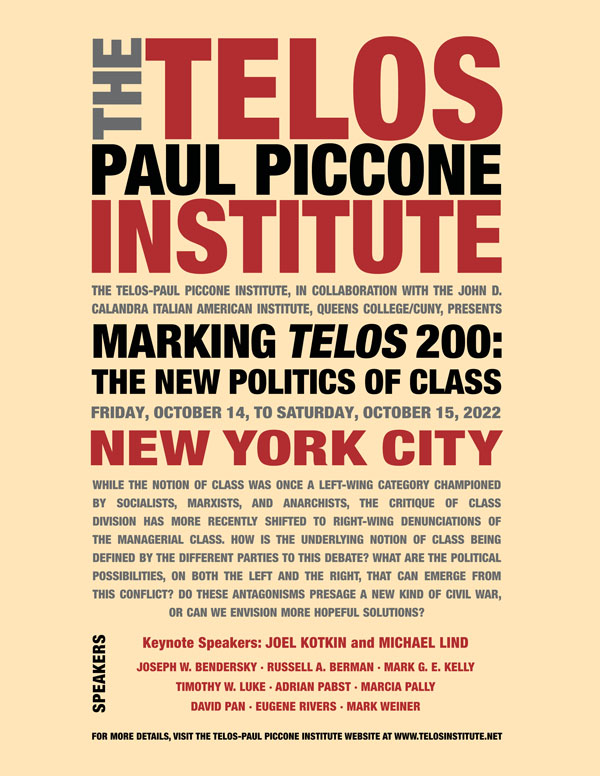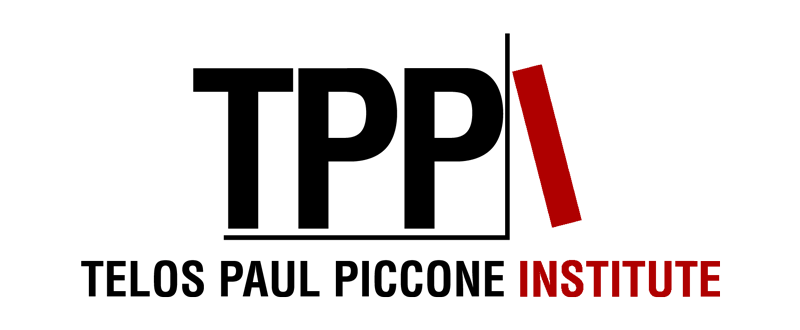Marking Telos 200: The New Politics of Class
October 14–15, 2022
The John D. Calandra Italian American Institute, Queens College/CUNY
New York, NY
Marking Telos 200: The New Politics of Class
Keynote Speakers
Joel Kotkin, Roger Hobbs Presidential Fellow in Urban Futures at Chapman University in Orange, California, and author of The New Class Conflict
Michael Lind, Professor at the Lyndon B. Johnson School of Public Affairs at the University of Texas at Austin, and author of The New Class War: Saving Democracy from the Managerial Elite
Conference program (PDF)
Videos
Event Description
 In the last fifteen years, the discussion of class has shifted with the rise of the Tea Party and then Trumpism in the United States. Whereas the notion of class used to be a left-wing category championed by socialists, Marxists, and anarchists, the critique of class division has now shifted to right-wing denunciations of the managerial class. This shift toward a populist politics targeting the new class has long been a topic of discussion in Telos, starting with the classic 1975 essay by Alvin Gouldner "Prologue to a Theory of Revolutionary Intellectuals" (in Telos 26) and continuing through Paul Piccone's work in the early 1990s in essays such as "The Crisis of Liberalism and the Emergence of Federal Populism" (in Telos 89) and "Postmodern Populism" (in Telos 103). A search of the Telos archive will uncover literally hundreds of essays that address various aspects of this issue. The recent popularizing of the critique of the new class has led to a conflict between the liberal pursuit of redistributive policies and the expansion of the welfare state, on the one hand, and the populist attempt to disempower governmental managerial elites and dismantle the welfare state, on the other hand. How is the underlying notion of class being defined by the different parties to this debate? What are the political possibilities, both on the left and on the right, that can emerge from the conflict? Is this conflict leading to a new kind of civil war, or can we envision new solutions?
In the last fifteen years, the discussion of class has shifted with the rise of the Tea Party and then Trumpism in the United States. Whereas the notion of class used to be a left-wing category championed by socialists, Marxists, and anarchists, the critique of class division has now shifted to right-wing denunciations of the managerial class. This shift toward a populist politics targeting the new class has long been a topic of discussion in Telos, starting with the classic 1975 essay by Alvin Gouldner "Prologue to a Theory of Revolutionary Intellectuals" (in Telos 26) and continuing through Paul Piccone's work in the early 1990s in essays such as "The Crisis of Liberalism and the Emergence of Federal Populism" (in Telos 89) and "Postmodern Populism" (in Telos 103). A search of the Telos archive will uncover literally hundreds of essays that address various aspects of this issue. The recent popularizing of the critique of the new class has led to a conflict between the liberal pursuit of redistributive policies and the expansion of the welfare state, on the one hand, and the populist attempt to disempower governmental managerial elites and dismantle the welfare state, on the other hand. How is the underlying notion of class being defined by the different parties to this debate? What are the political possibilities, both on the left and on the right, that can emerge from the conflict? Is this conflict leading to a new kind of civil war, or can we envision new solutions?
In addition to engaging with these questions, our event will feature Telos editors, who will discuss the past and current trajectories of Telos as well as Telos 200, devoted to the place of truth at the university.
Telos has always had a conflicted relationship with universities. On the one hand, university academics have constituted the primary audience and contributors to Telos. On the other hand, Telos has always maintained a distance from university structures, precisely because of the tie between universities and the managerial class, and previous special issues in Telos 81 and Telos 111 have attempted to address this problem.
Today, the situation of universities has become more dire than ever. Trapped between the pressure to provide job training on the one hand and political advocacy on the other hand, the idea of a search for truth sounds hopelessly naive as a description of the task of colleges and universities today. Matching the shift of our society toward technocratic and managerial solutions to problems, the natural and social sciences have become recognized authorities based on their claim to being scientific. Yet the authority of "science" is misleading in the sense that science never has straightforward answers but relies on a method of constant questioning. Science itself cannot be counted on to make policy decisions but can only provide relevant information for decision makers. Recent pieces in TelosScope by Russell Berman and Mathieu Slama address this issue by looking at the way pandemic policies were dominated by an ideology of "following the science" that amounted to an abdication of democratic decision-making.
Meanwhile, university discussion and debate about decision-making, traditionally the place of the humanities and social sciences, have been suppressed in favor of a focus on political engagement. The range of perspectives available for discussion has been reduced, to the exclusion of those views that might challenge the technocratic bias and the reduction of politics to identity politics that have become dominant at universities.
This narrowing of perspectives has also undermined the research project of the university. The exclusion of relevant perspectives in university debates has degraded the peer review process in the social sciences and the humanities, maintaining an orthodoxy that favors the reinforcement of previously held views rather than the challenging of such views. Such research can then be cited as the "scientific" basis for a set of policy prescriptions that have been agreed upon in advance. Where Max Weber once lamented the transformation of the lecture hall into a pulpit, it is difficult today for academics to avoid the pressure to either conform to a particular political perspective or, in rejecting such politicization, to be forced into an "obstructionist" camp.
In the midst of these developments, what is the status of the idea of truth? Will truth necessarily remain subordinate to politics? How might the search for truth remain a focus of colleges and universities?
In addressing these questions, the 200th issue of Telos features contributions by Joseph W. Bendersky, Russell Berman, Valerie J. D'Erman, J. E. Elliott, Wayne Hudson, Michael Hüther, Mark G. E. Kelly, Tim Luke, Richard T. Marcy, Greg Melleuish, David Pan, Susanna Rizzo, and David Westbrook.
Event Videos
Telos Perspectives on the Problems of the University System
Moderated by David Pan
Panel discussion with Marcia Pally, Joseph Bendersky, and Tim Luke
First Keynote Presentation by Joel Kotkin:
The New Class Divides and Their Implications for the Future
Moderated by Adrian Pabst
Response by Russell A. Berman
Second Keynote Presentation by Michael Lind:
The New Politics of Class
Moderated by Marcia Pally
Response by Adrian Pabst
Telos: Past and Future
Moderated by Mark Weiner
Panel discussion with Eugene Rivers, Russell Berman, David Pan, and Mark G. E. Kelly
